Posted on Mar 30, 2017 in
COVER STORY
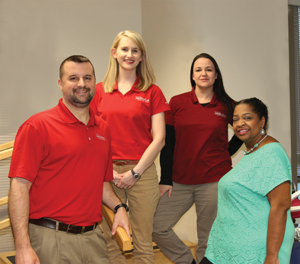
Dan Kershner, PT, Kim Kainer, OTR, Carol Wilson, SLP, and patient Debbie Gibbs.
COVER STORY | Photos by Mary Favre –
For patients at Houston Methodist Sugar Land Hospital, a comprehensive team approach to treatment and rehabilitation makes all the difference. Just ask Debbie Gibbs of Sugar Land, an active retiree who stayed busy with household tasks and caring for her family, including her three grandchildren. “She was very sharp,” said her daughter Caresha. “She handled everything on her own and was always on the go.”
But all that changed last November. After elective surgery at a hospital in the medical center, Gibbs began struggling mentally and physically. Her family – thinking her symptoms were the result of side effects from anesthesia – expected her to improve with time.
Instead, her condition worsened. Within a few days, she had lost all movement on her right side and was having difficulty talking. When it became clear that something was seriously wrong, Gibbs’ family took her to the emergency room at Houston Methodist Sugar Land Hospital. “That was the best decision we could have made,” said Caresha.
Excellent Hospital for Stroke Care
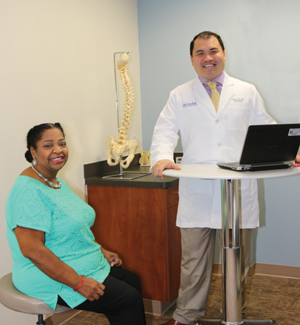
Patient Debbie Gibbs with Larry Tran, MD.
When a patient exhibiting stroke symptoms arrives at Houston Methodist Sugar Land Hospital, the staff takes immediate action. The hospital has a neurologist available 24 hours a day, seven days a week, and the emergency room (ER) staff is specially trained to respond during the “golden hour,” when a stroke can be most successfully treated with the clot-busting drug alteplase, commonly referred to as tPA, an acronym for tissue plasminogen activator.
“We have a well-defined protocol for stroke patients that starts the moment they arrive in the ER,” said neurohospitalist James Ling, MD, a board-certified neurologist and medical director of the hospital’s Stroke Program. “From that instant, their treatment is a priority. We work as a team to ensure that we respond as rapidly as possible. Evaluation by a neurologist, CT scans, blood work – it all happens quickly so that we can administer tPA, dissolve the clot that is causing the stroke and restore the flow of blood to the brain.”
Since 2011, Houston Methodist Sugar Land Hospital has been recognized for excellence in stroke care by the American Stroke Association. Most recently, the hospital was awarded the association’s Gold Plus Honor Roll Elite status for consistent achievement in meeting or exceeding national stroke quality protocols.
Comprehensive, Coordinated Care
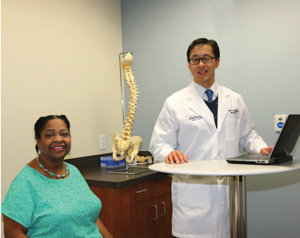
Patient Debbie Gibbs with James Ling, MD.
When Gibbs arrived at the hospital, ER staff immediately recognized her symptoms and contacted Ling, who took over her care. Tests confirmed that Gibbs had indeed suffered a stroke, but it had been several days at least – the golden hour had long passed.
Ling discovered that Gibbs unknowingly suffered from a combination of high blood pressure, high cholesterol and diabetes – what doctors call metabolic syndrome, which greatly increases the risk of heart attack or stroke. Ling started her on medications designed to treat those conditions and monitored her in the hospital for four days until her condition was stable.
Once Gibbs was stable, Ling recommended that she see board-certified neurologist Larry Tran, MD, with Houston Methodist Sugar Land Hospital’s Neuroscience & Spine Center. Tran developed a care plan that included careful monitoring of her risk factors along with a detailed program of physical, occupational and speech therapy – designed to help Gibbs regain the mental acuity and mobility she lost when the stroke blocked the flow of blood to her brain.
“At that point, she was probably at about 15 percent of her capabilities,” said Caresha. “It was awful to see her struggle with day-to-day activities.”
“I couldn’t do much of anything,” said Gibbs. “I couldn’t move my right leg or arm, I had a hard time talking, and I couldn’t remember simple things.”
Road to Recovery
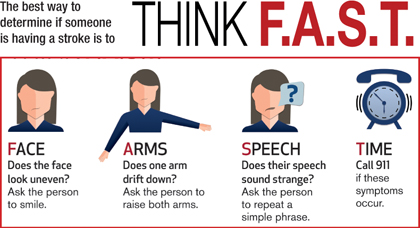 For recovering stroke patients, therapy can make a significant difference. “It’s really all about rehab,” said Tran. “But it requires a lot of commitment and work, and patients need the support of their families to keep them motivated. We are fortunate to have an outstanding, highly skilled therapy team here at our Neuroscience & Spine Center, and patients can receive physical, occupational and speech therapy all in one place with a team that works in a coordinated fashion to maximize their care. That’s not something you find everywhere.”
For recovering stroke patients, therapy can make a significant difference. “It’s really all about rehab,” said Tran. “But it requires a lot of commitment and work, and patients need the support of their families to keep them motivated. We are fortunate to have an outstanding, highly skilled therapy team here at our Neuroscience & Spine Center, and patients can receive physical, occupational and speech therapy all in one place with a team that works in a coordinated fashion to maximize their care. That’s not something you find everywhere.”
Gibbs worked primarily with three therapists at Houston Methodist Sugar Land Hospital – physical therapist Dan Kershner, occupational therapist Kim Kainer and speech/language pathologist Carol Wilson. Together, the team implemented a comprehensive therapy plan that helped Gibbs improve her balance, mobility and agility, as well as her ability to communicate more effectively.
“For a stroke patient, it’s important that all three therapy disciplines are on the same page,” said Wilson. “A patient typically needs to make improvement in all three in order to return to a more independent lifestyle. Think about a simple trip to the grocery store. You need language, writing, walking, reaching, holding and memory. If you take away one piece of that puzzle, it all falls apart.”
“It was clear to us from the beginning that the therapists were a cohesive team,” said Caresha. “They were always working together on Mom’s behalf.”
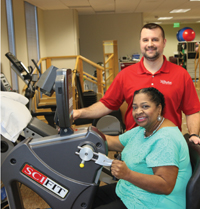
Debbie Gibbs with Dan Kershner, PT.
Gibbs’ family was directly involved in her therapy, asking questions, learning how they could help with home exercises and encouraging her along the way. For example, Wilson taught the family how to utilize a technique called multimodal communication when Gibbs couldn’t remember a specific word.
“If Mom couldn’t come up with the word ‘apple,’ rather than get frustrated, she learned to describe what she wanted using words like ‘round’ and ‘red’ and ‘fruit’ so that we could better understand,” said Caresha.
Choosing Houston Methodist
Thanks to her own motivation, the support of her family and the compassionate care she received at Houston Methodist Sugar Land Hospital, Gibbs has made remarkable progress.
“I’m back at my computer, and I can pay bills and go to the grocery store,” she said. “I can do just about everything I did before. I’m really surprised at how far I’ve come.” Caresha said the decision to bring her mom to Houston Methodist Sugar Land Hospital was perhaps the most important step in her recovery.
The Neuroscience & Spine Center at Houston Methodist Sugar Land Hosptial
 The Neuroscience & Spine Center at Houston Methodist Sugar Land Hospital has board-certified physicians who work together to provide comprehensive, personalized care designed to help patients return to a productive lifestyle.
The Neuroscience & Spine Center at Houston Methodist Sugar Land Hospital has board-certified physicians who work together to provide comprehensive, personalized care designed to help patients return to a productive lifestyle.
They offer expedited appointments, including second opinions, with highly regarded specialists. The team of neurosurgeons, neurologists, orthopedic spine surgeons and interventional pain specialists treat a wide variety of disorders:
- Alzheimer’s and Memory Disorders
- Amyotrophic Lateral Sclerosis (ALS)
- Back and Neck Pain
- Brain and Spinal Tumors
- Epilepsy and Seizures
- Headaches and Migraines
- Multiple Sclerosis (MS)
- Muscle and Nerve Injuries
- Muscular Atrophy
- Myasthenia Gravis
- Neuromuscular Disorders
- Parkinson’s Disease and Movement Disorders
- Peripheral Neuropathy
- Sleep Disorders
- Stroke
To schedule an appointment with the Neuroscience & Spine Center at Houston Methodist Sugar Land Hospital, call 281-972-5178.

 <
<










 For recovering stroke patients, therapy can make a significant difference. “It’s really all about rehab,” said Tran. “But it requires a lot of commitment and work, and patients need the support of their families to keep them motivated. We are fortunate to have an outstanding, highly skilled therapy team here at our Neuroscience & Spine Center, and patients can receive physical, occupational and speech therapy all in one place with a team that works in a coordinated fashion to maximize their care. That’s not something you find everywhere.”
For recovering stroke patients, therapy can make a significant difference. “It’s really all about rehab,” said Tran. “But it requires a lot of commitment and work, and patients need the support of their families to keep them motivated. We are fortunate to have an outstanding, highly skilled therapy team here at our Neuroscience & Spine Center, and patients can receive physical, occupational and speech therapy all in one place with a team that works in a coordinated fashion to maximize their care. That’s not something you find everywhere.”
 The Neuroscience & Spine Center at Houston Methodist Sugar Land Hospital has board-certified physicians who work together to provide comprehensive, personalized care designed to help patients return to a productive lifestyle.
The Neuroscience & Spine Center at Houston Methodist Sugar Land Hospital has board-certified physicians who work together to provide comprehensive, personalized care designed to help patients return to a productive lifestyle.